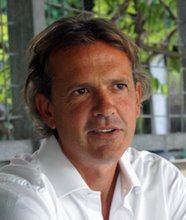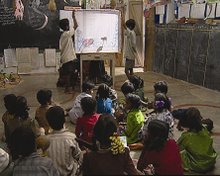Robert André lives in Paris. He has resided in France for the past 15 years. After studying literature in his hometown at the University of San Diego, California, he attended the University of Leuven in Belgium. A scholar in the Edmund Husserl Archives, he was awarded a degree in Philosophy. Mr. André then returned to the United States where he worked in the field of psychology for the State of California. He later decided to return to Europe and settle in France where he has focused his work in the arts.
In France, he studied acting and directing under Ludwik Flaszen who was co-founder, along with Jerzy Grotowski, of the Laboratory Theatre in Poland. Mr. André went on to study film and video with Philippe Ros and Jacques Pigeon. This led to his work as free-lance cameraman on a number of independent films. He has directed his own short films including Waltzing, filmed in wartime Bosnia and Herzegovina in collaboration with the Theatre of Tulza; and the documentary film Forbach Opus II, a lyrical ballad contrasting a festival of new music along the French-German border with the closing of coal mines in the region and the effect this had on the people of these communities. Mr. André’s documentary and fiction screenplays; include: L’Apero; Kiss Me I’m Serb; and You Are Here.
India has been his focus for the past four years. Robert André has worked on several film and video projects in Pondicherry and Bangalore as well as in the State of Orissa. In India, his work has been as a screenplay writer, director and cinematographer. School Without Walls is Robert André’s most recent documentary film project. It was produced by Mosaïque Films in Paris. The filming took place in the State of Andhra Pradesh, India.
To contact Robert André mailto:rhdiego@yahoo.com
12 décembre 2007
School Without Walls
16 décembre 2006
School Without Walls receives Prix du Jury
07 décembre 2006
School Without Walls at the Documentary Film Festival Ambigat, France
Le 2ème Festival de films documentaires Ambigat a lieu à Châteaumeillant (Cher), près de Bourges, du 10 au 18 novembre 2006. Il est associé à la 7ème édition du Mois du film documentaire, événement national.
The documentary film School Without Walls by Robert André has been selected to participate in the 2nd annual Festival of documentary films Ambigat, at Chateaumeillant (Cher) in France. The festival is part of the National event Month of the Documentary Film held annually in France. The festival will take place from the 10th to the 18th of November, 2006. This is the second consecutive year School Without Walls has been selected to participate in the Month of the Documentary Film in France.
75th Anniversary of the Rishi Valley School
The prestigious Rishi Valley School, founded by J. Krishnamurti, in Andhra Pradesh, India is celebrating its 75th Anniversary on the 4th and 5th of November. As part of this celebration, where Alumni from around the world will come together, the documentary film School Without Walls will be screened throughout the day on the campus grounds.
School Without Walls and the World Bank
The Harvard Business School (HBS) is presenting the India Schoolhouse Fund (ISF) project developed by Annie Bertrand, to the World Bank on the 26th of October, 2006. The goal of ISF is to eradicate poverty through quality education and entrepreneurship in the north of India. As part of their project, the ISF is using the Rishi Valley School’s RIVER approach to education. HBS will be referring to Robert André’s documentary film School Without Walls to demonstrate how this approach works in the context of rural India
02 septembre 2006
Les Secrets d'une école indienne (film documentaire/documentary film) reviewed in Télérama

The feature-length documentary, School Without Walls, had multiple screenings throughout India in 2005. This same version premiered in France through the festival circuit in 2005-2006. A shortened version, entitled "Les Secrets d'une école indienne", aired in France on the cable channel Planete throughout this month.
The review in Télérama is available in the links to the right.
30 mai 2005
School Without Walls - Synopsis
____________
There was once a time when children in a small village, deep in rural India, sang under the tall palm trees, ran across the green fields, danced amongst the most ancient of stones, and watched the moon and stars at night. They called that school…and still do.
School Without Walls is at one and the same time, both an enchanted voyage and an onerous story. Little Ashwini and her friends from the village take you by the hand and bring you into their homes and their school. This discovery of the villagers’ everyday life reveals their rich tradition, colourful folklore, and music. The men reunite, discuss, and drink. They have their own way of looking at life, and the changes taking place in their community. In a more intimate manner, the women confide the plight of their situation, their work, their married life, and their children’s education, wherein hope still reigns.
The RIVER program was started by the Rishi Valley School founded by Jiddu Krishnamurti (1895-1986). Their challenge was to introduce education into this deep rural context. Through the children and their parents, you discover how this program adapts to their way of life and respects their traditions. The school becomes an integral part of their community where the villagers take part, the children enjoy learning, and the women have hope.




